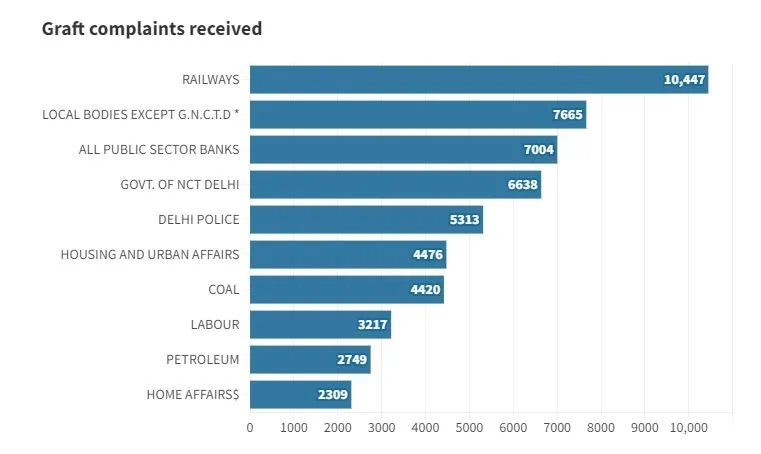Syllabus: GS2/Governance
Context
- Central Vigilance Commission (CVC) has released the report revealing the corruption complaints against various government officials in 2023.
Major Highlights
- Of the total corruption complaints received, the highest number of complaints was against railway employees, followed by those in Delhi’s local bodies and public sector banks.
- Of the total complaints received against railway employees, 9,881 were disposed of and 566 were pending.

- As many as 74,203 graft complaints were received against all categories of officers/employees in 2023, of which 66,373 were disposed of and 7,830 were pending.
Central Vigilance Commission (CVC)
- It was set up by the Government of India (Ministry of Home Affairs) vide Resolution in 1964 on the recommendation of the Santhanam Committee.
- It aims to promote integrity, transparency, and accountability in the public sector.
- Mandate: The CVC is tasked with overseeing and ensuring the proper functioning of various government departments and public sector enterprises.
- It investigates allegations of corruption and malpractices against public servants.
- Appointment of Members: The Central Vigilance Commissioner and the Vigilance Commissioners are appointed by The President of India on the basis of the recommendation of a committee consisting of:
- Prime Minister as Chairmen of the Committee.
- The Minister of Home Affairs as a member of the committee.
- Leader of the Opposition in the House of the People as member of the committee.
- Autonomy: The CVC operates independently of the government to ensure impartiality in its investigations and recommendations.
- Term of Office: The Central Vigilance Commissioner shall hold office for a term of four years from the date on which he enters upon his office or till he attains the age of sixty-five years, whichever is earlier.
- Removal of Members: Only the President has the power to remove the Central Vigilance Commissioner or any vigilance commissioner from the office under the following circumstances:
- If proved an insolvent.
- If he has been convicted of an offence which, in the opinion of the Central Government, involves moral turpitude.
- If holds any Office of Profit.
- If he is unfit to continue in office by reason of infirmity of mind or body.
Corruption
- Corruption may be defined as an act of bribery or misuse of public position or power for the fulfillment of selfish motives or to gain personal gratifications.
- India ranked 93 out of 180 countries on the corruption perceptions index for 2023 according to a Transparency International report.
- The index, which ranks 180 countries and territories by their perceived levels of public sector corruption according to experts and business people, uses a scale of 0 to 100, where 0 is highly corrupt and 100 is very clean.
Government of India Initiatives for Combating Corruption
- Prevention of Corruption Act (1988): This act aims to prevent corruption in public life by criminalizing the act of accepting or giving bribes.
- It has undergone amendments to address emerging challenges in corruption.
- Right to Information Act (RTI) (2005): This act empowers citizens to seek information from public authorities, thereby promoting transparency and accountability in government functioning.
- Digital India Program: Launched to improve governance and transparency through technology, this program aims to digitize public services and reduce opportunities for corruption.
- e-Governance: The implementation of online platforms for government services (e.g., passport applications, income tax returns) reduces bureaucratic red tape and minimizes the chances of corruption.
- Whistleblower Protection: The Whistleblowers Protection Act (2014) safeguards individuals who expose corruption and wrongdoing in government and public sector enterprises.
- Government e-Marketplace (GeM): This online platform aims to make public procurement more transparent and efficient by enabling direct procurement by government departments and public sector enterprises.
- Anti-Corruption Units: Various state governments have established their own anti-corruption bureaus and vigilance commissions to handle corruption cases at the state level.
Source: TH
Previous article
News In Short – 04-09-2024